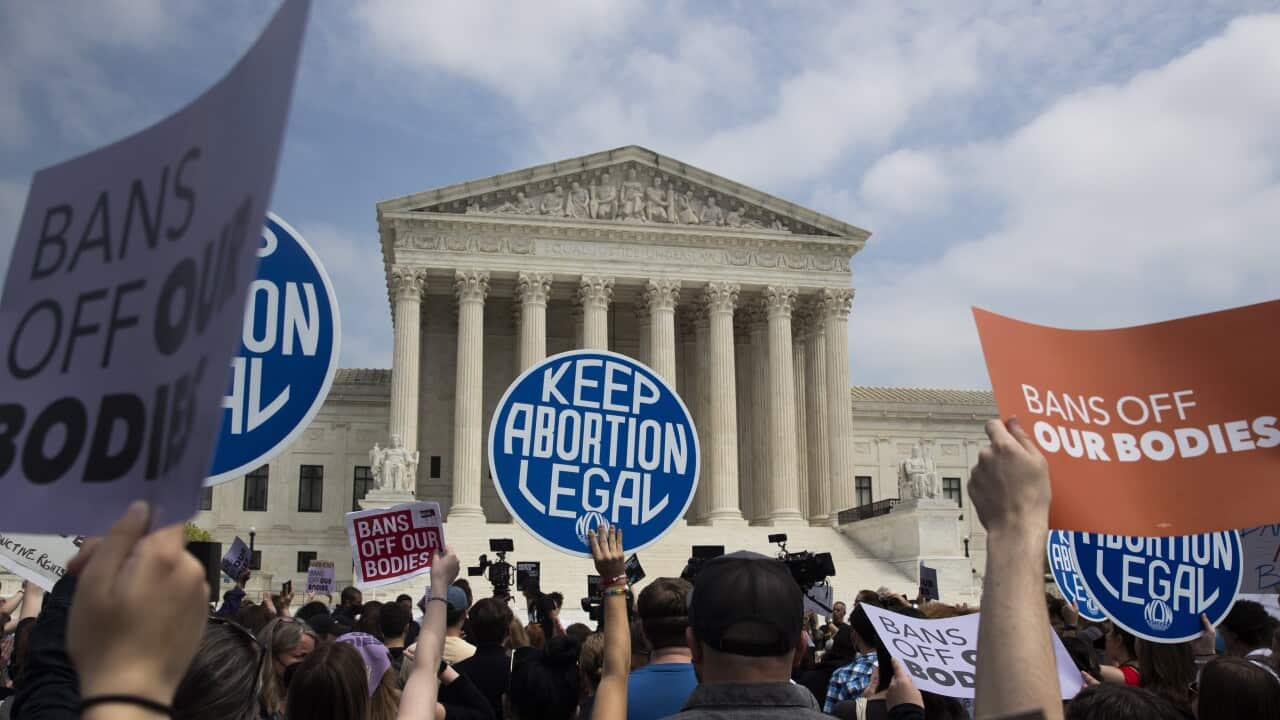

6 min read
This article is more than 1 year old
Roe v Wade: A year on from the landmark decision, this is what abortion access looks like
It has been a year since the Roe v Wade decision was overturned. Here is an overview of the current landscape of abortion access in the United States.
Published
By Francesca De Nuccio, Jessica Bahr
Source: SBS News
Image: In 2022, the United States Supreme Court overturned Roe v Wade, the landmark ruling that for nearly 50 years guaranteed a constitutional right to abortion. (EPA / Michael Reynolds)
Amanda and Josh Zurawski couldn't wait to be parents.
After a year of fertility treatments, Ms Zurawski fell pregnant in May last year, and the couple were overjoyed.
But 18 weeks in, she was diagnosed with a medical condition and was told her baby would not survive.
Ms Zurawski could not legally get an abortion due to strict laws in their home state of Texas, which is one of 14 to enact near-total bans since the one year ago.
"Doctors couldn't intervene and provide health care, which in this case was an abortion, because the baby’s heart was still beating, and I wasn't considered sick enough," she said.
Three days later, Ms Zurawski's health deteriorated, and a life-threatening infection led to sepsis.
At the hospital, she was induced into labour and miscarried her daughter.
Now, Ms Zurawski is among 13 women and two doctors who have filed a first-of-its-kind lawsuit against the state of Texas, hoping to get the ban reversed.
"They say that these laws are pro-life well, whose life? Because it certainly didn't protect my life," she said.
"It's going to take all of us coming together to fight this fight. And if I can provide any sort of courage or space for people to do that, I'll consider that a win."

Amanda Zurawski and her husband Josh were overjoyed when they found out they were having a baby, but they later learned their daughter would not survive. Source: Supplied
Those who violate such laws - both the patient and their doctor - .
In some cases, they can also face up to life in prison.
Dr Anne Banfield, Maryland St Mary's Hospital obstetrics and gynaecology chair, said the effect on medicine was "chilling".
"You can be penalised for providing the standard of care, but you can also be penalised for not providing the standard of care," she said.

Amanda and Josh Zurawski were caught up in Texas' strict anti-abortion laws when Amanda experienced medical complications during pregnancy. Source: Supplied
Where is abortion legal in the United States?
Roe v Wade was a landmark 1973 Supreme Court decision that established access to abortion as a constitutional right until the foetus is viable outside the womb, typically 22 to 24 weeks.
The decision prevented all 50 states from being able to ban access to abortions outright.
In June 2022, the Supreme Court voted to overturn the decision, leaving states to set their own restrictions.

Many states in the United States have near-total bans on abortion. Source: SBS News
Several other states have similar bans, which have been temporarily blocked by the courts.
Twenty-six states have kept abortion legal, with many of these adding protections such as enshrining access in the state constitution.

Some states have added protections in their constitutions to protect access to abortions. Source: SBS News
Do Americans support abortion?
According to a recent Gallup poll, a record 69 per cent of Americans surveyed said abortion should be legal in the first three months of pregnancy.
But opponents of abortion say it simply shouldn't be an option.
Carol Tobias, president of the anti-abortion organisation National Right to Life, said she hoped no woman would choose an abortion.
"I want this country to be in the situation where even if abortion is legal, no woman wants one, that she would realise that the life that she is carrying inside of her is precious and special, and is going to make her life better, not worse," she said.
The decision to overturn Roe v Wade has also put the Supreme Court - which has a conservative majority - under scrutiny.
Mary Ziegler, professor of law at the University of California, Davis, said the Supreme Court had become more political in recent years.
"To some extent, the Supreme Court has always been somewhat political ... presidents appoint justices they think will side with them on the questions of the day," she said.
"I think the current Supreme Court has been less concerned about its reputation for being apolitical and for that reason has done things that were much more sweeping and much more divisive."
In the lead-up to the 2024 presidential election, abortion remains a prominent issue.
Democrats have vowed to make reproductive rights a pillar of their campaign, while Republicans are caught between their conservative base and the view of the wider public.
Professor Ziegler said the issue would be a "litmus test" for democracy.
"You have, on the one hand, a pretty clear consensus emerging that Americans want abortion to be legal ... and you have a situation where the anti-abortion movement has allies in both state legislatures and the courts that are willing to push for a denial of access," she said.
"I think it's really going to be a litmus test for American democracy."
Is abortion legal in Australia?
Abortion has been decriminalised in all Australian states and territories, .
This week, proposed reform in Western Australia - which has the strictest laws - was introduced to parliament in the hopes of bringing the state in line with the rest of the country.
Bonney Corbin is the policy and research head at MSI Australia, a non-profit abortion provider, and said the issue in the US has had ripple effects in Australia.
"More people in Australia started having conversations about their own experiences of abortion," she said.
"They talked to people in their families and communities, and we had an uprising like we hadn't seen before - the rallies, the noise that people made, really led to more public conversations about abortion, and late last year, we saw a Senate inquiry into universal access to reproductive healthcare."
Ms Corbin said while abortion is decriminalised in Australia, those in need of abortion face many of the same hurdles as those in the US.
"Accessing abortion is about the barriers to abortion care, and the barriers we see are cost, travel, access to childcare, stigma, and things like being able to get time off work and access to people to support you," she said.
"Australia is very much part of a global network when it comes to abortion rights and reproductive rights.
"Our national context is quite safe in terms of abortion access, (but) it's about knowing that we're part of a global community, and we need to support each other and everyone within that community."



